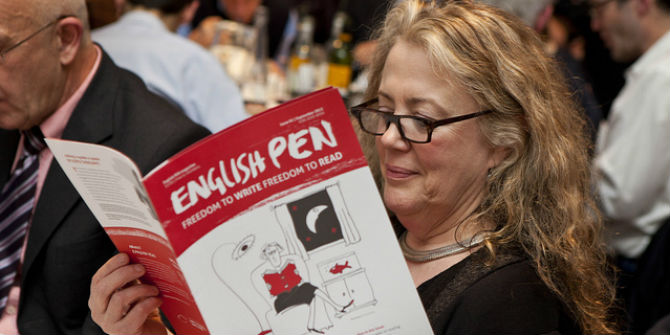 In light of the apparent government pressure on the Guardian newspaper in the wake of the Snowden revelations and refused FOI requests, Justin Schlosberg of Birkbeck, University of London, argues for more transparency in dealings between government and the media.
In light of the apparent government pressure on the Guardian newspaper in the wake of the Snowden revelations and refused FOI requests, Justin Schlosberg of Birkbeck, University of London, argues for more transparency in dealings between government and the media.
Perhaps not surprisingly in the wake of phone hacking, the Prime Minister appears to be steadily curtailing his personal contact with senior media figures, based on data released by the government for 2011-13. Interestingly though, the Cabinet Secretary – Sir Jeremy Heywood – is more than picking up the slack, with 10 recorded meetings with the media in 2012 and 14 in 2013. In contrast, Heywood’s predecessor Gus O’Donnell had just two meetings with the media in 2011, one of which was a ‘reception’ hosted by the Financial Times. This raises the possibility that some of the business of media management by the government (or vice versa) is increasingly being conducted through the civil service, perhaps in an effort to remain under the radar. In any case, given that Leveson’s focus was elsewhere, the spike in contact between the Cabinet Secretary and the media warrants scrutiny.
Mostly Conservative-allied press meets the Cabinet Secretary…
The first thing to note is that like his ministerial colleagues, the cabinet secretary’s contact with the media is overwhelmingly concentrated on the national press: of the 24 meetings in 2012-13, just three were with broadcasters (BBC and ITN). This could be because of a received wisdom in government that the national press remain leaders of the wider news agenda. Or it could be because newspaper editors and proprietors are more active than broadcasters in lobbying the government for influence and/or ‘scoops’. Or it could also be because the government is conscious of the broadcasters’ regulated impartiality, whereas newspapers may be seen as more malleable targets in agenda building strategies.
In any case, the imbalance illustrates how much newspapers still matter to Whitehall, for all the talk of their demise. But it is not just newspaper bosses in general who occupy a disproportionate amount of the cabinet secretary’s time. Again, in line with ministerial colleagues, a significant majority of the meetings were with representatives of the conservative right wing press. Of the 10 meetings Jeremy Heywood had with the media in 2012, seven were with the Times, Telegraph, Mail and Spectator magazine, all openly aligned with the Conservative party; two were with non-partisan outlets (the Economist and ITN) and one with the left-leaning Guardian newspaper.
This may simply reflect the market dominance of the right-wing press in Britain. It is perhaps understandable that if the cabinet secretary is going to meet regularly with the press, he would want to prioritise those titles that have the biggest audience reach, regardless of their political colours. But it doesn’t explain why most of his meetings are with the elite press – broadsheets and periodicals – with very limited exposure compared to the mid-market and tabloid titles. Again, there are a number of plausible explanations here. It could be that mid-market and tabloid editors and executives aren’t very interested in talking to government bureaucrats. It could be because the ‘serious’ news sector is particularly valued in Whitehall for its opinion-leading reputation and its elite audience capture. Or it could just be because these titles have the capacity to cover political issues with greater depth and complexity than their lower brow competitors.
… unless one needs to be pressured
Whatever the reason, the opacity of these meetings appeared to take something of a sinister turn in 2013. After the Guardian began publishing details of mass surveillance by the security services in June 2013, revealed by NSA whistleblower Edward Snowden, the Cabinet Secretary unusually held two meetings in short succession at the Guardian’s offices. A Freedom of Information request for details of these and other meetings with the senior newspaper figures has recently been refused and is currently under review by the Information Commissioner. According to Alan Rusbridger – the newspaper’s editor – he was explicitly threatened with legal injunctions during his meetings with the cabinet secretary, unless he agreed to destroy hard drives of the leaked material. The only account we have from the government is the notes recorded in the meeting data. The first meeting was described simply as a “discussion about handling information” whilst the follow-up apparently moved on to “discussion about international issues”.
In the end, the newspaper acceded to the government’s demands, confident that destruction of the hard drives would not curtail reporting. Copies of the material lodged with US publishing partners would apparently ensure the story’s endurance. Glenn Greenwald – former lead journalist on the story for the Guardian and now the Intercept – recently claimed that the biggest story relating to the leaks is yet to be published. But he made no mention of what or when, and we are left wondering whether the government’s actions had really been as futile as Rusbridger suggested.
Pressure & lobbying exempt from disclosure
Rusbridger himself opted initially not to make public the threatening nature of his meetings with the cabinet secretary, or indeed the unprecedented event that followed, with security service personnel entering the Guardian offices to oversee destruction of the offending hard drives. A month later the Guardian despatched David Miranda – Greenwald’s partner – to meet Laura Poitras (another Snowden confidante and co-architect of the story) in Germany, perhaps in an effort to get around the loss of direct access to the material. According to Rusbridger, the rise in international travel was due to the necessity of face to face meetings as“we assumed everything was being at that point intercepted”. But on his return to Brazil, Miranda was arrested and detained at Heathrow Airport under anti-terror laws, prompting Rusbridger to publicise the extraordinary lengths the government was going to in order to restrain the coverage.
But what about the other meetings that took place around the same time between the cabinet secretary and the national press? Apparently, the purpose, nature and outcome of these meetings are also exempt from disclosure under the Freedom of Information Act, partly in order to protect policymaking. But the use of this exemption (under Section 35 of the Act) raises more questions than it answers. Perhaps the most obvious is what policy exactly do these meetings concern? In apparently typical fashion, the Cabinet Office made no attempt to explain why exemptions under Section 35 were engaged, or provide any detail as to the public interest test that is required under law.
It is fundamental to a functioning democracy that the media are seen to be free from undue influence or interference by the state and, conversely, that government and policymaking is free from undue influence or interference by the media. Over the last two years, these twin and sometimes conflicting concerns have become matters of acute public interest, fuelled by Leveson and Snowden alike. But the government’s refusal to disclose information about these meetings speaks to a wider problem. It exposes the gap between transparency rhetoric and substance which ensures that the real workings of power remain off limits to public scrutiny. It is a gap now so wide that official talk of transparency in media policymaking is tantamount to double-speak.
This post gives the views of the author, and does not represent the position of the LSE Media Policy Project blog, nor of the London School of Economics. This is an excerpt of a longer post originally published on the Media Reform Coalition blog, and republished here with permission from the author. For the author’s correspondence with the FOI authorities, please see:





